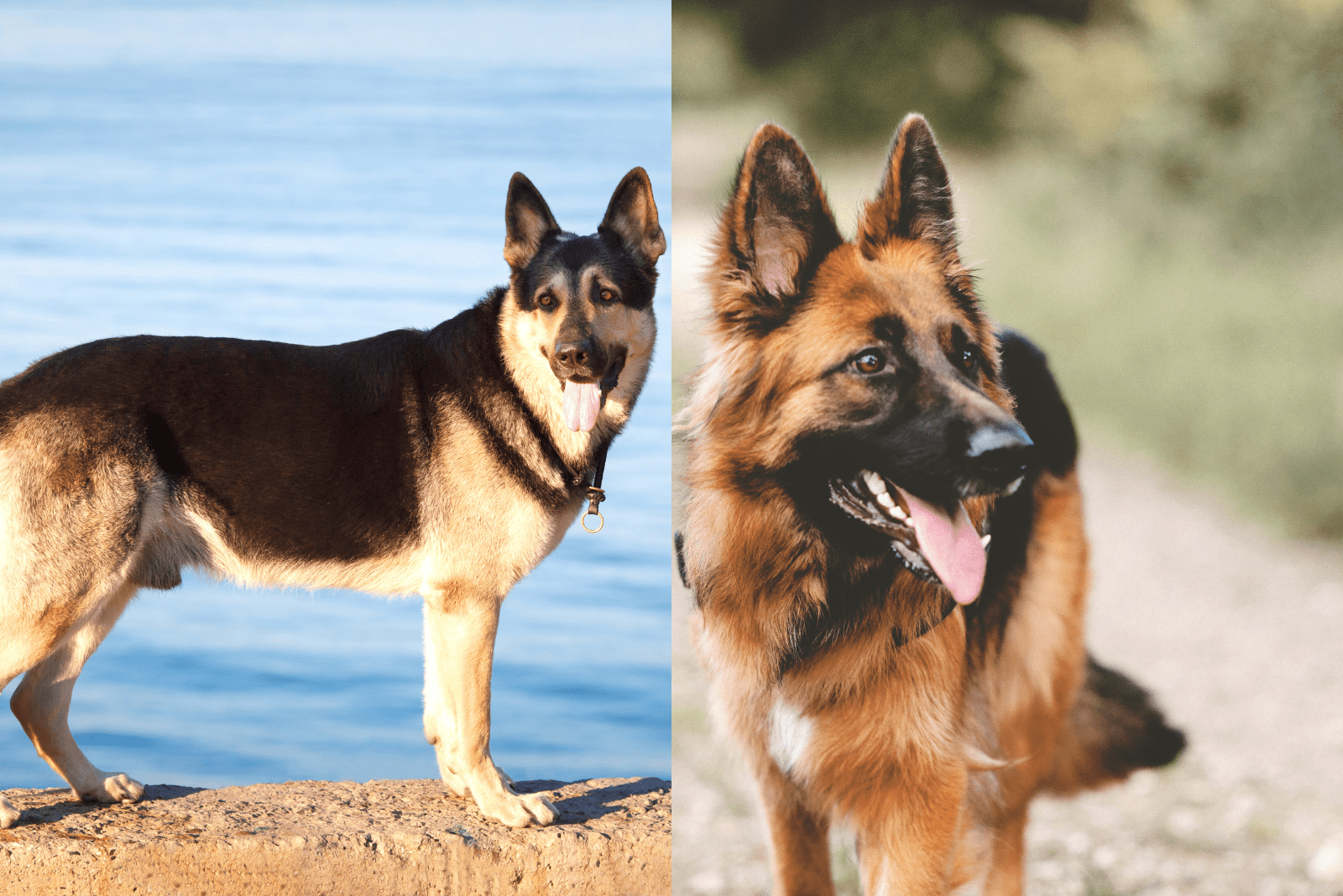The first time I saw a German Shepherd dog I was still a kid. But I remember I was mesmerized by their beauty and elegance in every move. Ever since then, I have been madly in love with this breed, so much so, that I own German Shepherds today.
Imagine my surprise when I first saw an East European Shepherd and when I was asked to compare the East European Shepherd vs German Shepherd. I was so confused!
What are these dogs? Are they related to German Shepherds? Most importantly, are they a purebred breed of dogs I didn’t know about?
As a dog expert, I was also a bit humiliated for not knowing about East European Shepherds. But then, I began to dig. Full research on the EES was in order. I had to figure out what made this dog so special.
The researcher in me wanted to find out all the differences between these two dogs that look so much alike.
Did I manage to bust the myth and learn all there is to know about the East European Shepherd?
Yes, and let me add something: I had no right to feel down for not knowing about this breed, as it’s one of the rarest in the world.
How about I show you all I learnt on the EES vs GSD comparisons and tell you which doggo you should pick as your new best friend?
Sit back, and relax, because we’re about to go back some 50 to 150 years ago to Germany and the former Soviet Union. Let the time travel begin!
Is There Any Difference Between An East European Shepherd Vs German Shepherd?
Absolutely!
If there were no differences, we wouldn’t be here today comparing the East European Shepherd vs German Shepherd.
There are no two identical dogs. Not even two German Shepherds look alike that much. There’s always at least one difference that makes that dog special and unique.
Naturally, the differences between the East European Shepherd breed and the German Shepherd breed must occur because they’re two separate breeds. Precisely, the East European Shepherd is a hybrid dog. They’re not purebred, but they were designed using purebred dogs only.
And, yes, they were designed under the influence of the German Shepherd.
What dog experts from Russia wanted to do back in the day was to get the improved, Russian version of the German Shepherd. More on that soon.
German Shepherds are purebred dogs with their own breed standard. We know their exact origin, purpose of breeding, appearance, and general behavioral pattern.
Even though they differ from the European and the American German Shepherd, they’re still the same dog breed with certain dissimilarities in terms of their appearance or behavior.
What you should know before we head off to the origin story of both dogs is that the German Shepherd is recognized by the American Kennel Club (AKC). They have been in the club since 1908.
The East European Shepherd, the Vostochnoevropejskaya Ovcharka (VEO), or the Owczarek Wschodnioeuropejski will never be recognized by the AKC as they accept only purebred dogs. If you’re into dog shows, this may bother you. But if you’re looking for companion dogs, this is only a minor issue.
Now, let’s move on to the background stories of our two Shepherd buddies.
Background Stories
Since we’ve established that the German Shepherd and the East European Shepherd are two separate breeds, it would be great to know their origin stories. One of these dogs is much older than the other one. Which one is it? Where exactly are these shepherd dogs from and who was the founding father of their breeds?
Let’s find out!
The Origin Of A German Shepherd
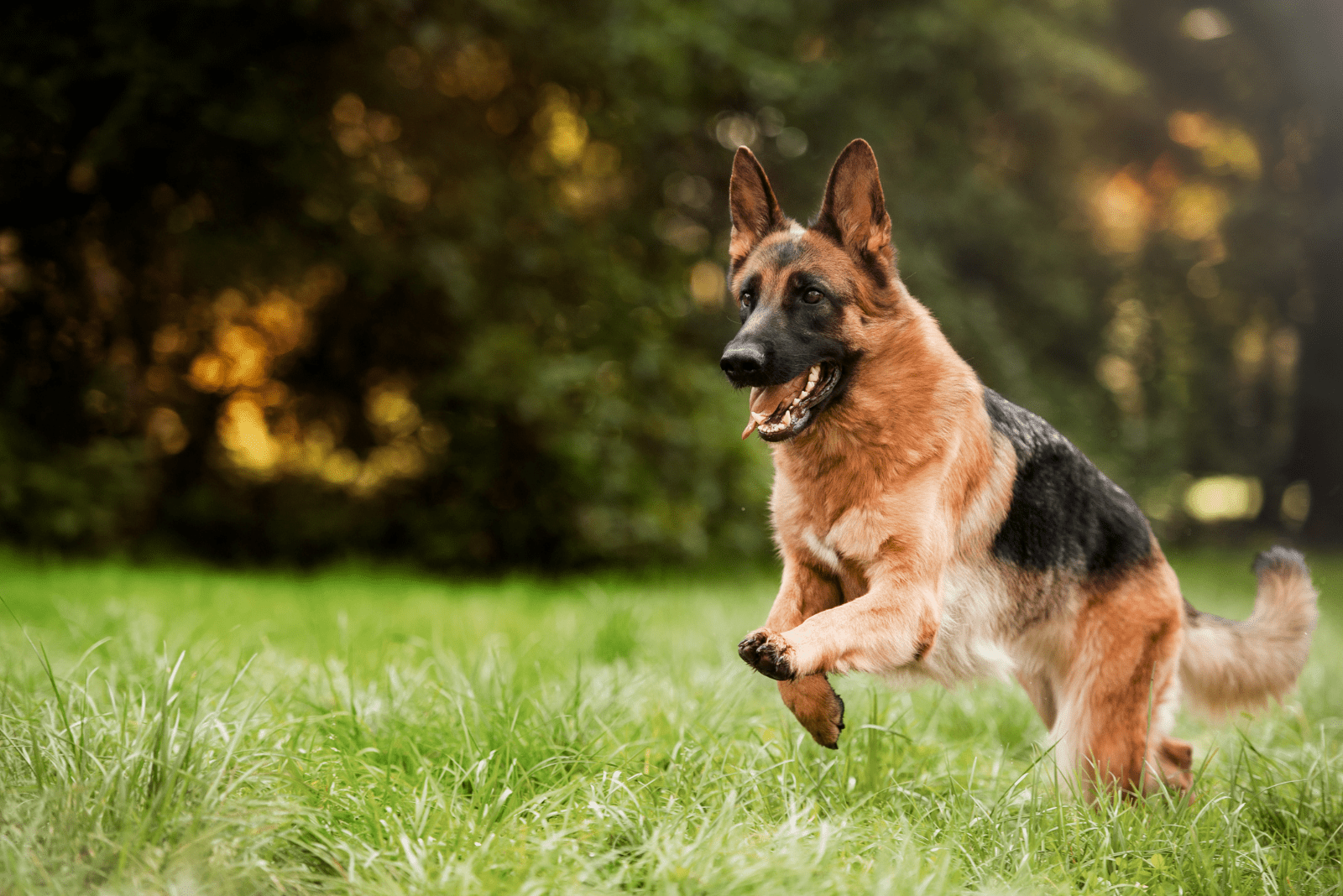
You don’t have to guess about the land of origin of these dogs. German Shepherds are definitely from Germany! This country is often used as a synonym for discipline and great quality. No wonder why German Shepherds are one of the world’s finest, most obedient, and hard-working dog breeds.
The first specimens of the German Shepherd dog breed were brought to the world in the late 1800s. We owe Max Von Stephanitz a huge thank you for coming up with this dog breed. If he didn’t put his efforts into improving the German Shepherd, as the ultimate working dog, we wouldn’t be blessed with GSDs today.
Von Stephanitz used lots of working sheepdogs to get the best version of German Shepherds.
The popularity of German Shepherd dogs grew as the world approached the Great War. GSD’s role as shepherd dogs and a working force was replaced by the role of military dogs. German Shepherds were used as ammo carriers and messengers.
Future war activities also required the use of German Shepherds.
We can assume the intimidating factor the GSD possesses is because of their service day during the wars. People are pretty much afraid these dogs are aggressive. But a well-trained German Shepherd can only be a friendly, wonderfully ethical pet that will guard you with his life.
The Origin Of An East European Shepherd
The East European Shepherd is a crossbreed, definitely not a purebred dog. Even though this doggo may look like a cousin of a German Shepherd, just like the Belgian Malinois, it’s not the case. The East European Shepherd is a result of breeding old lines of German Shepherds.
But, the country of origin isn’t Germany, or east of Germany.
This dog breed comes from Belarus, one of the countries that used to make the Soviet Union or the USSR. That’s why the East European Shepherd is also known as the Byelorussian Ovcharka or the Vostochnoevropejskaya Ovcharka.
We can’t say this is a 100% Russian dog breed, because the origins are linked to German dogs, but the many years have distinguished this dog into being Russian. A lot of dog breeds developed in Russia were influenced by already-popular breeds.
Russia and the Soviet Union were always closed to foreigners, and they didn’t trust strangers easily. This resulted in the invention of something new, something better, something they could brag about.
The Eastern European Shepherd is one of those accomplishments.
First Byelorussian Ovcharkas appeared in the 1920s, but the breed was polished to perfection by the 1950s. This is the era of the Cold War, another huge reason why Russians wanted to have their own signature products, much better than the originals.
Dogs used in the breeding process of a Byelorussian Ovcharka weren’t only German Shepherds. They also used Caucasian Shepherds, Laikas, and Central Asian Shepherds. This way they got a dog that looks like the German Shepherd but is more cut out to live in cold weather.
These dogs were extremely valued by the Russian KGB, and used for police work, military duties, and detection.
Even though common people are able to get East European Shepherds as pets, they’re still not that popular. The question is, will they ever achieve the popularity of their German relatives?
Appearance Differences Between These Two Shepherds
The biggest difference between the East European Shepherd and the German Shepherd is their appearance. Despite the fact these dogs have similar features, they’re still very much different.
You’ll immediately notice the difference between these two if you put these dogs together. Who is bigger? Which Shepherd has a thicker coat?
Why don’t we discuss each Shepherd’s appearance individually?
German Shepherd Appearance
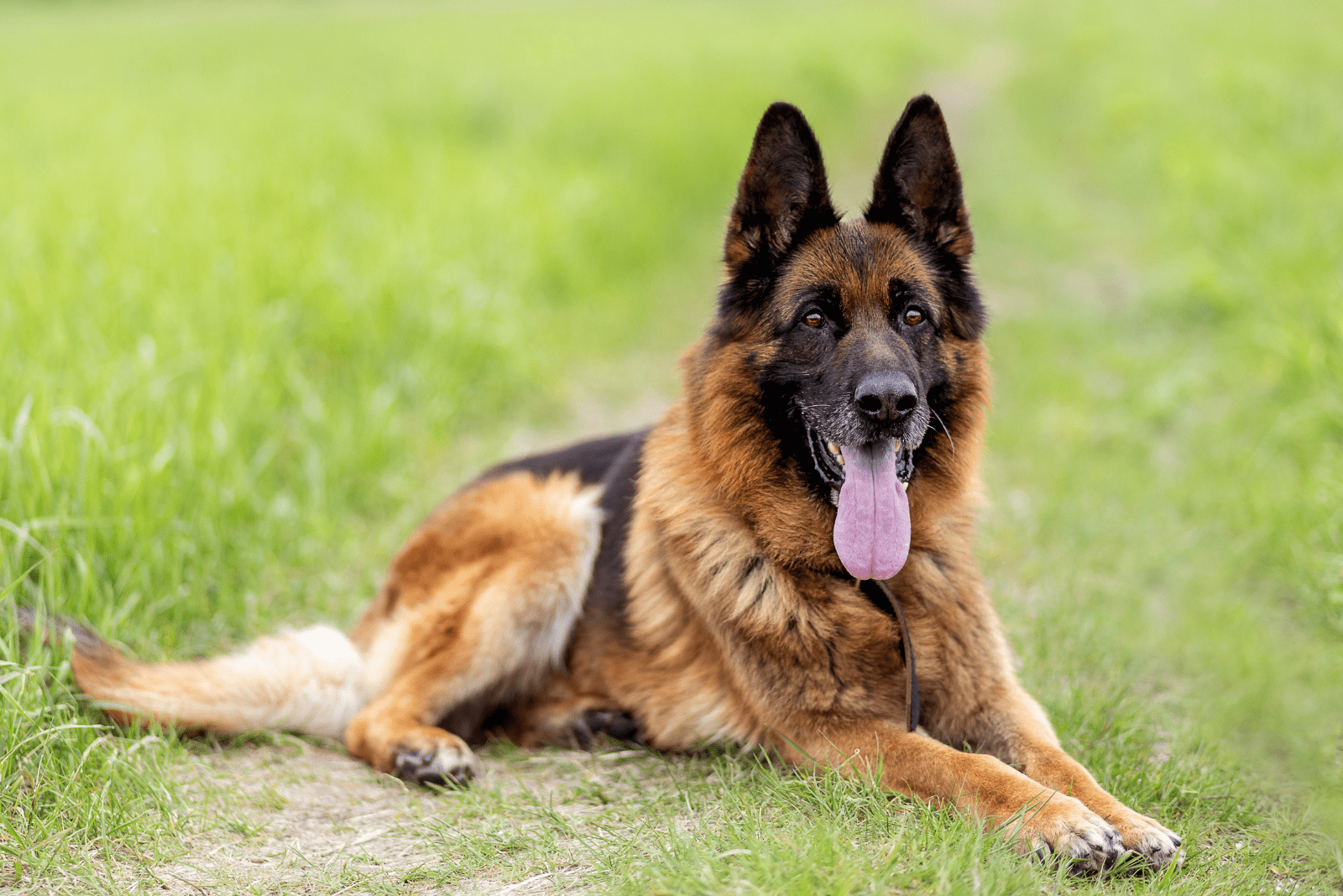
When you put the German Shepherd next to the European Shepherd, you’ll notice the German Shepherd is a smaller dog. But the difference is only a few inches.
Male German Shepherds tend to grow up to 26 inches at the withers. They usually weigh from 65 to 90 pounds.
Females are always a bit smaller, standing tall at a maximum of 24 inches at the withers, and weighing no more than 70 pounds.
These dogs are muscular, but they’re not overpacked like Bulldogs or Rottweilers.
The German Shepherd is a sporty dog with agility written all over its body. It doesn’t matter if you pick between the male or the female GSD, because both are quite sporty and fit.
The characteristic signature marks for German Shepherds are a wedge-shaped muzzle, a lowered back and a fluffy tail. Also, German Shepherds are one of the dogs with pointy ears.
People recognize German Shepherds for their rich coats. These dogs have double coats. Their undercoat is soft and sheds a lot, while the outer coat is coarse. Interestingly enough, German Shepherds come in short-haired and long-haired versions. The long-haired version is even more troubling to groom!
Besides the popular black and tan color, German Shepherds also come in other, rich coat colors like:
East European Shepherd Appearance
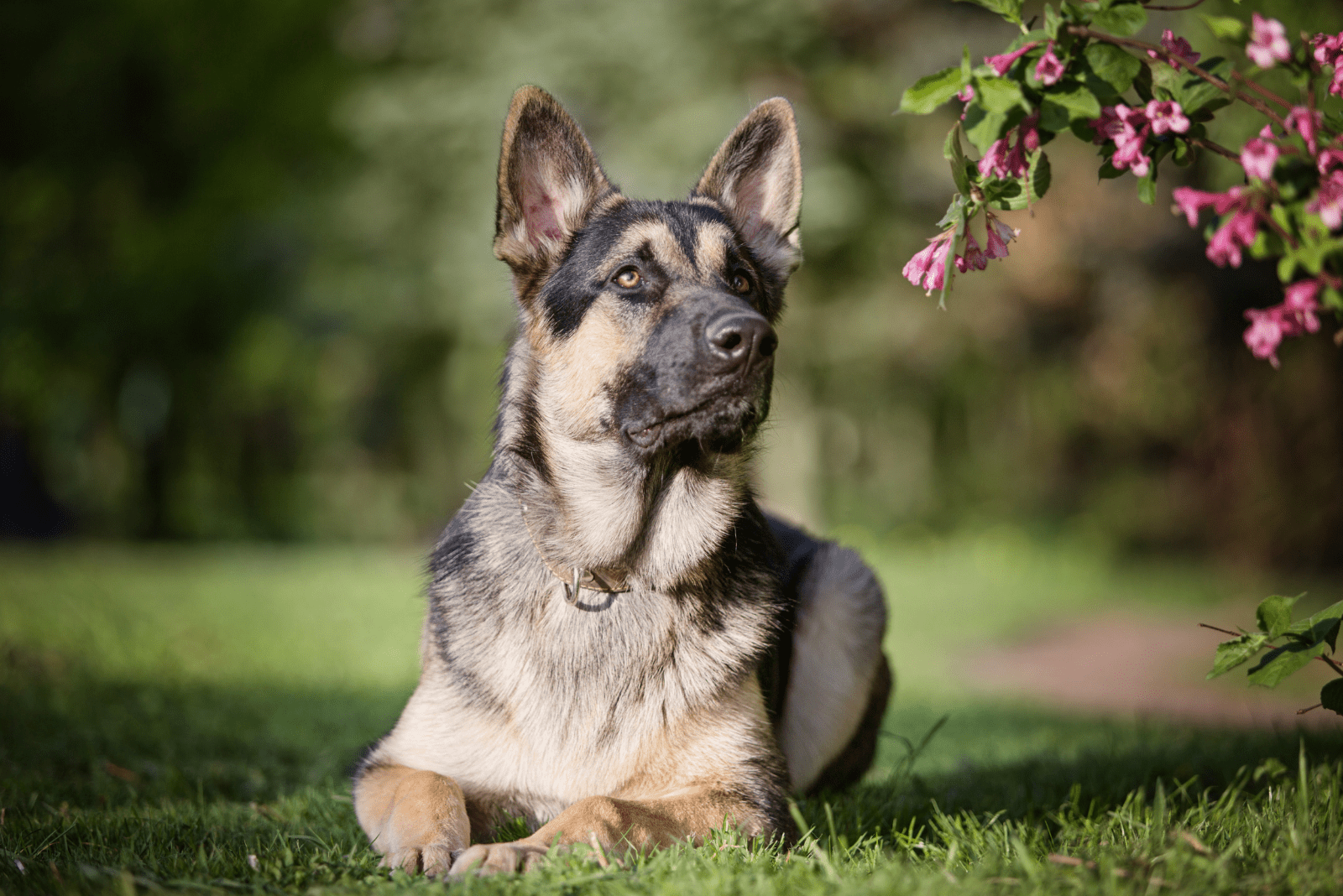
As I mentioned earlier, the East European Shepherd is a bit bigger than the German Shepherd. This definitely has a lot to do with the fact big dogs like Caucasian Shepherds were used to create the VEO.
An average East European Shepherd should grow up to 28 inches at the withers and weigh around 110 pounds.
Seems like the East European Shepherd is just…massive! Everything’s big with this dog breed, including their head, muzzle, and muscular body.
Since this was a breed designed to live in harsh weather conditions, they will have a thicker, denser coat than the German Shepherd.
If you thought German Shepherds were big shedders, wait until you see the East European Shepherd. That’s a whole other level of shedding! VEO’s medium-length coat sheds all the time, so you’ll need all the help you can get with brushing these dogs.
East European Shepherds come in lots of different coat shades, including black and tan or red, as well as sable gray and sable red.
However, the most sought-after color of VEO dogs is solid black. The black coat was highly appreciated by the KGB, and you have to admit it adds to their scariness factor. However, the solid black coat shouldn’t be used as a reference to aggressive behavior.
Trainability: Who Learns Better And Faster?
One thing you won’t have issues with is training any of these Shepherd dogs. Seems like these dogs were purposely bred to enjoy learning. I’m not saying they’re canine nerds but give them any task and you’ll see it being finished within moments.
Our Shepherd doggy friends like to listen to their owners. They love feeling useful and will jump on their feet the second you’re about to give them a command. Their herding genes are still strong, thus the strong obedience trait.
If I had to compare the German Shepherd and the East European Shepherd, I’d say the German Shepherd learns better and faster than the EES. Don’t let this discourage you, because the EES is right behind the GSD.
The German Shepherd dog breed is extremely intelligent. The unique mashup of different Russian dog breeds and GSD traits has made the East European Shepherd incredibly intelligent too.
The main difference in training these dogs is their stubbornness.
The EES can be more stubborn than the German Shepherd. I encourage you to use positive reinforcement to overcome the stubbornness factor. Also, I suggest you always keep your dog’s mind exercised. Mental stimulation toys are a terrific way to do it.
All in all, the differences between training the East European Shepherd vs the German Shepherd are the slightest possible.
Which Of The Two Shepherd Breeds Is Healthier?
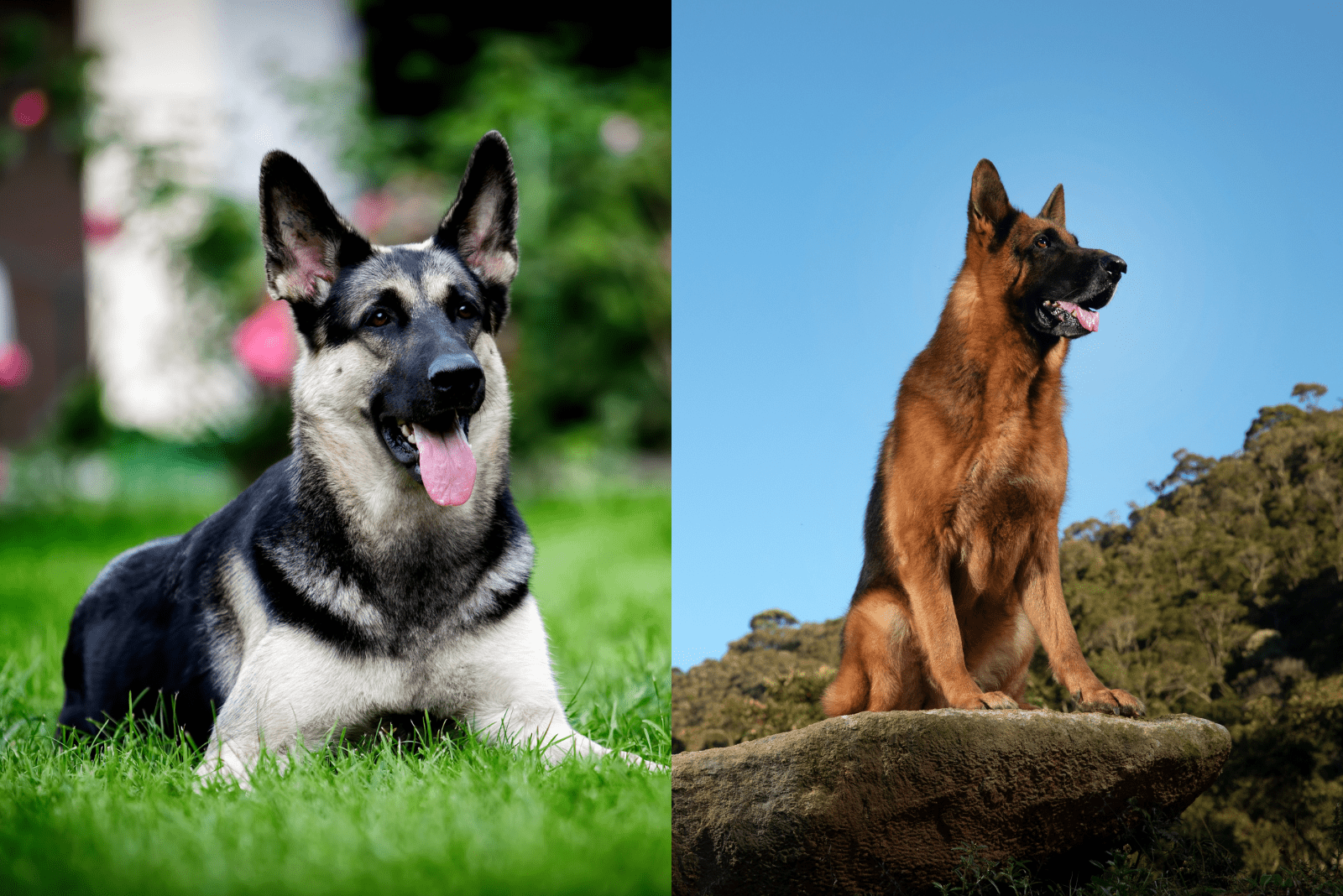
There’s no breed without a health problem. All dogs suffer from certain diseases. Some are more likely to occur, while others aren’t. Some dogs are even more capable of dealing with them, some are not.
This is natural and you shouldn’t fight it. If your dog is likely to become ill, there’s nothing but good care you can do to prevent it.
Generally speaking, both the German Shepherd and the EES are dogs of good health. Normally, there are some conditions they’re more prone to. Usually, large dogs are prone to mobility issues, thanks to their big bodies and big energy levels.
If I have to pick between the Ovcharka vs the German Shepherd, I’d say German Shepherds are a tad bit healthier. This is mainly because their lines are clear, and never mixed with other shepherd dogs like the VEOs.
The most common health issues these dogs can face are:
gastric dilatation and volvulus or bloat
All of the listed conditions require immediate medical help. Dysplasia of any kind can be highly painful and can cause further issues like arthritis. Bloat is something that strikes lots of big dogs, as they tend to eat right after exercising. And degenerative myelopathy is a spinal cord injury that may cause paralysis.
As you can see, all of the listed conditions should be treated before your dog’s condition becomes worse.
Make sure you take good care of your EES or GSD to help them live their full lifespan of 9 to 13 years. The EES may live a year shorter than the GSD, but still, that’s completely individual.
The Cost Of Owning These Shepherds
I have to mention that it’s not easy to look after either one of these Shepherd dogs. They can be quite pricey, and I’m not talking about their initial purchase price only.
The availability of the German Shepherd dog breed has affected their price significantly. A pet-quality German Shepherd’s price is usually only $1,000 or less. Of course, there are always breeders that will list their puppies for more money than some others.
The GSD price, especially for champion litters, can be quite high.
What you should do is pick a reliable breeder and be aware of what you’re paying for.
As for the price of the East European Shepherd, it’s usually around $1,200. That is if you manage to find a good breeder to trust.
Besides the initial purchase price, a huge chunk of first-year expenses will go on dog food. Most breeders recommend you continue with the recipe puppies used to have for lunch when they were little. But, even then, some dogs will show signs of disliking that recipe.
Then, you’ll need to switch formulas, and lose money, all before you figure out which dog food suits your German Shepherd. I can recommend some kibble brands and recipes that are good for German Shepherds, as well as for East European Shepherds here.
But that’s not all! Where are dog leashes, toys, and beds?
What’s great about German Shepherds and East European Shepherds is that they can share the same beds, harnesses, food bowls, etc. Dogs like them need extra-quality dog beds like the ones listed here. Also don’t forget to include some of the finest harnesses and leashes to keep them nice in place, walking right next to you.
Where To Find German Shepherds And EES Dogs In The States?
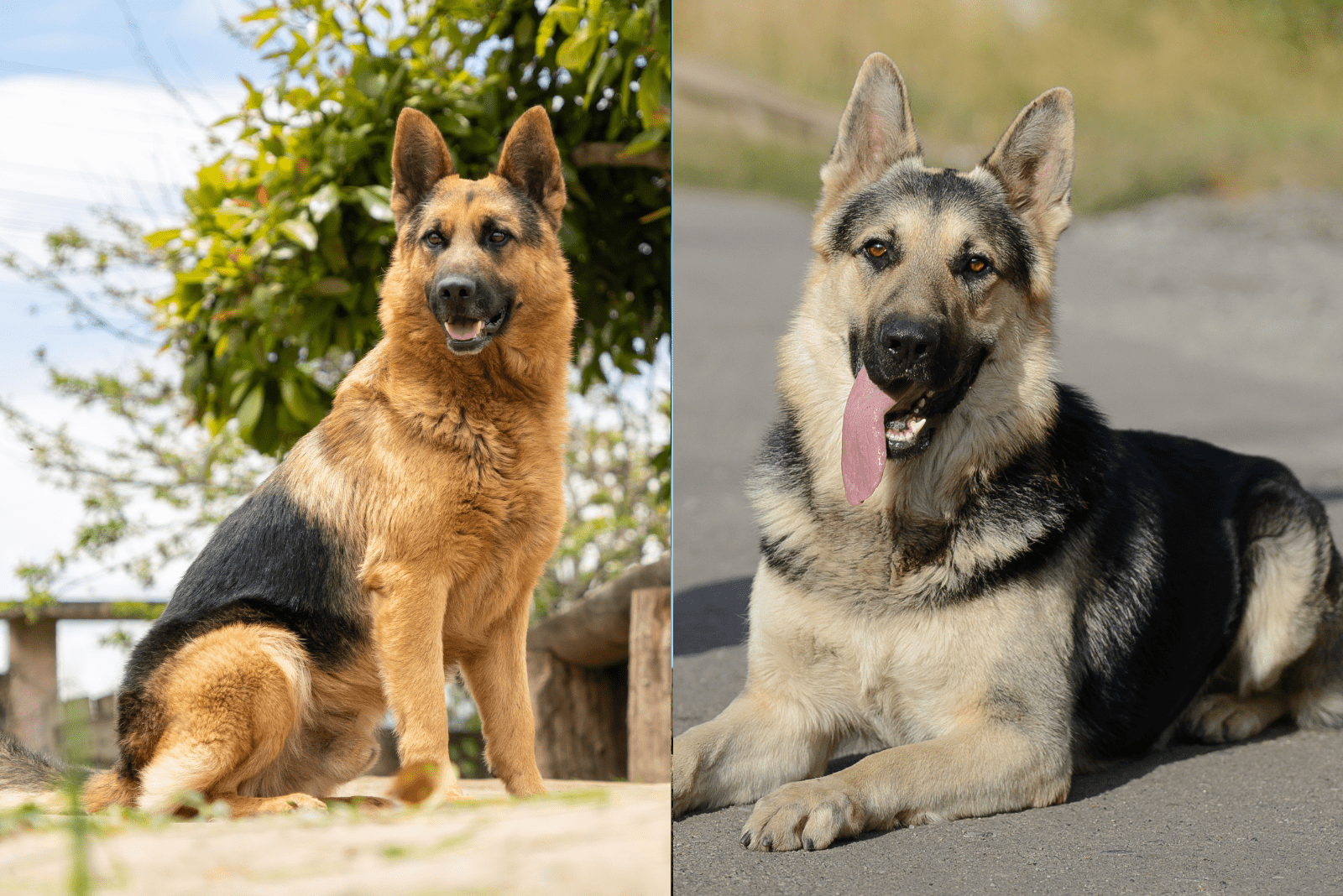
As one of the most popular dog breeds in the world, German Shepherds have lots of incredibly good breeders. Every US State has at least a dozen GSD breeders you can trust. The fact that this is the second most popular dog breed says a lot.
However, popularity always comes with a price. Despite so many good German Shepherd breeders, we still have a lot of unreliable sources and scammers. This is one of those breeds you can find on every corner, hence so many scammers trying to use those dogs for their own profit.
You should only trust a GSD breeder if he breeds only to improve the breed and make at least one part of their appearance better. Reputable breeders actually care about raising dogs with great temperaments, pleasant looks, and overall excellent health statuses.
Scammers don’t care about any of these aspects at all.
So, how to know which of so many GSD breeders is the right one?
You can rely on PupVine! Check out our lists of best GSD breeders in the States:
German Shepherd breeders in California
German Shepherd breeders in Florida
German Shepherd breeders in Wisconsin
German Shepherd breeders in New York
German Shepherd breeders in Ohio
German Shepherd breeders in Colorado
German Shepherd breeders in Washington
German Shepherd breeders in Georgia
German Shepherd breeders in Pennsylvania
German Shepherd breeders in Maryland
German Shepherd breeders in Massachusetts
German Shepherd breeders in Arizona
German Shepherd breeders in New Jersey
German Shepherd breeders in Virginia
German Shepherd breeders in Minnesota
German Shepherd breeders in Alabama
German Shepherd breeders in Illinois
Also, I’d like to recommend to you some great German Shepherd rescue organizations:
German Shepherd rescues in Ohio
German Shepherd rescues Wisconsin
German Shepherd rescues in Colorado
German Shepherd rescues in Florida
But, what about his buddy, the East European Shepherd?
Unfortunately, the number of East European Shepherds in the States is pretty low. At the moment, I have no knowledge of any reliable EES dog breeders whatsoever. Maybe you’ll have more chances of finding them in Canada.
However, I am absolutely pawsitive that the popularity of this breed will finally begin to rise. EES dogs are not for everybody. Only dog lovers with experience in handling working dogs should own EES dogs.
You should be extra careful whom you trust with your East European Shepherd puppy because there’s a huge chance, you’ll stumble upon a fake breeder looking to earn a pretty penny.
Which Shepherd Makes A Better Family Pet?
Before we discuss which Shepherd is a better family pet, we should remind ourselves about the origin of both dogs.
As you know, German Shepherds were bred to assist humans as shepherd dogs, and later as working or military dogs. It took a while before average families got interested in having a German Shepherd as a family dog.
To this day, German Shepherds are considered intimidating and a bit dangerous. People don’t trust them easily, despite the fact they’re super friendly, loyal, and as trainable as any smaller pooch. In fact, no one can stand shoulder to shoulder with German Shepherds when it comes to training.
However, they’re still more approachable than East European Shepherds. People don’t really trust Russian breeds because they believe they’re more dangerous. They were cut out differently, used to harsh climatic conditions, and thus being harsh themselves too.
I would recommend the German Shepherd as the better family pet because East European Shepherds require a lot more time, dedication, and skills to be trained properly. If you’re bringing an EES to a home with kids, strict training is crucial!
Relationship With Other Pets: Which Shepherd Is Friendlier?
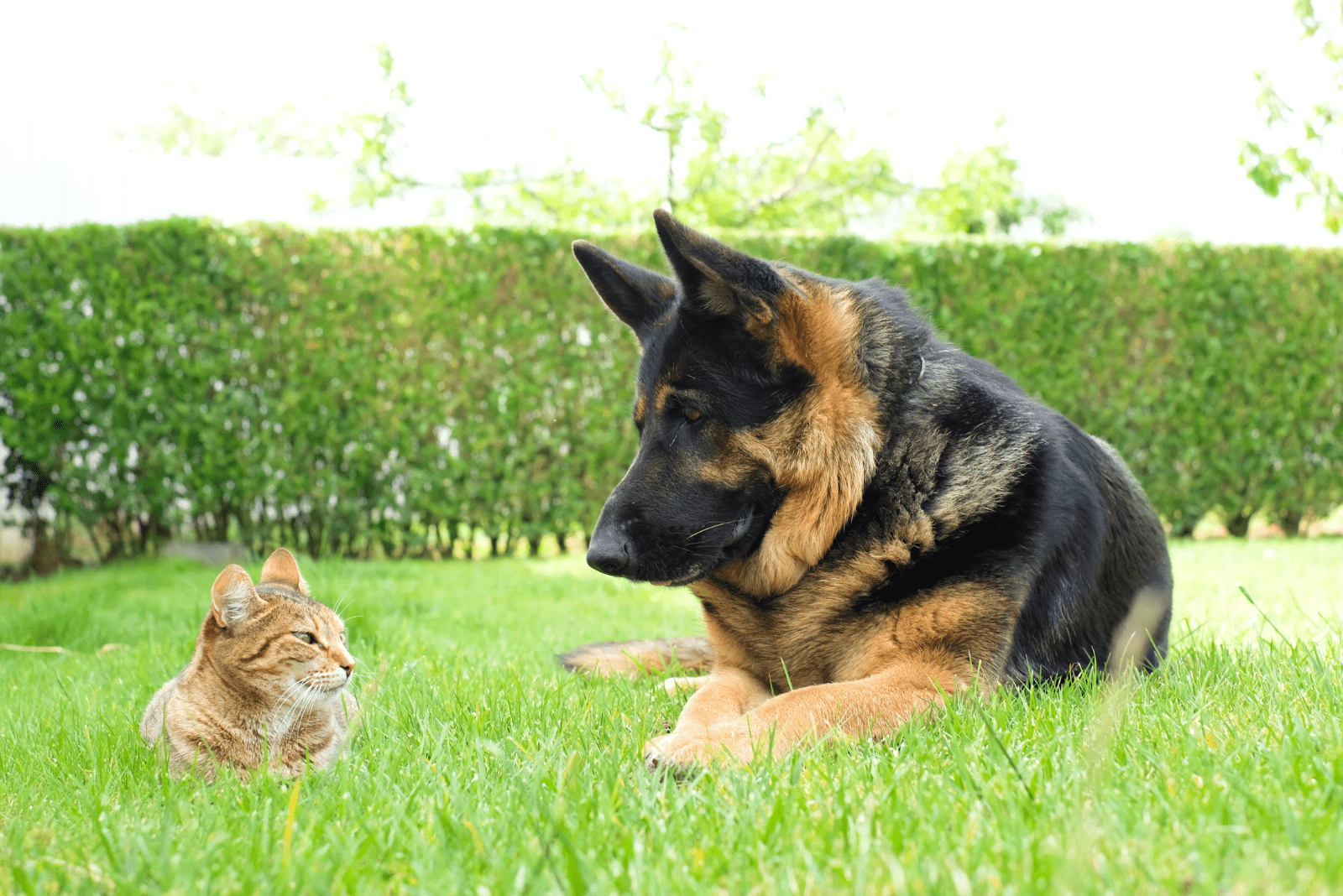
If you’re a dog lover that prefers to have more than one pet, you should know what our Shepherd buddies are like with other pets.
The issue with big, strong dogs isn’t their strength. It’s their temperament.
Dogs like German Shepherds and EES dogs are known for having alpha dog behavior. Basically, your dog will think he’s in charge and won’t let anyone get near him. This behavior issue is purely a result of their intuition and poor training.
The alpha dog behavior can be curbed with proper socialization lessons and obedience training. When owning a tough breed like the ones we’re discussing today, it is you who must have the role of the alpha dog. Your dog should listen to you, not vice versa.
This behavior may cause problems with our Shepherd buddies and other pets in the house, especially if the other pets come afterwards. It looks like the GSD and the EES say: Hey, I’m in charge here. You’re not going to mess that up for me.
I wouldn’t risk bringing a cat or a tiny dog into a home where German Shepherds or East European Shepherds rule. Small animals may turn on their high prey drive and cause irreparable damage.
If I really have to pick between the VEO vs the German Shepherd, I’d go with the GSD, because they’re more obedient and can get along with other pets better than the EES.
Grooming: Which Shepherd Is Easy-Maintenance?
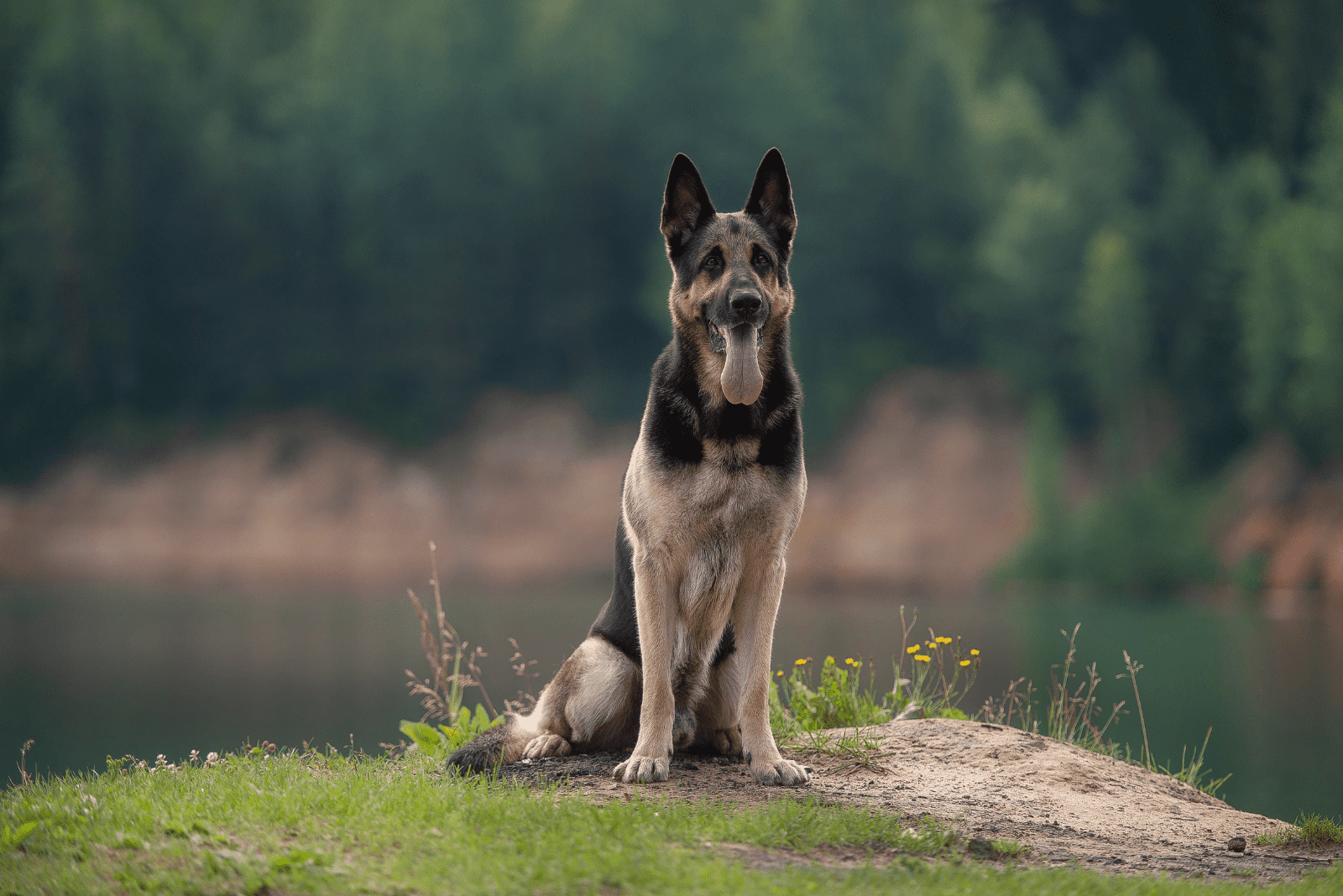
None of these Shepherds is easy or low maintenance. We all know which are low-maintenance dogs, right? Those are pups like Bichons or Poodles, dogs that don’t shed and don’t require that much grooming.
German Shepherds aren’t easy to groom at all. There’s even a popular saying among GSD owners that says: German Shepherds shed only twice a year, from January to June, and from July to December.
Get it?
German Shepherds shed constantly throughout the year. They’re not hypoallergenic dogs as they lose quite a bit of dander too. If you have basic knowledge of hypoallergenic dogs, you’ll know that it’s not only the hair that causes allergic reactions, it’s dander and saliva too.
Well, German Shepherds sure have lots of it!
German Shepherds have double coats, with a dense undercoat and coarse top layer. There’s no difference between long haired vs short haired German Shepherds because grooming both of them takes time.
Neither the GSD nor the EES should skip grooming sessions. Also, you shouldn’t bathe a GSD too often. Dogs like German Shepherds don’t stand excessive bathing as it can dry out their skin and cause excessive hair loss.
Since we don’t have much information on the East European Shepherd, we can rely on their similarities with German Shepherds. And coat grooming is definitely one of those similarities.
The East European Shepherd was designed for harsh climates; thus the slightly thicker coat needs more care.
These dogs should be brushed daily if you can commit to it. If not, try to stick to a brushing schedule of three to four times a week.
I recommend you check out some of the best brushes for German Shepherds as they can be used for East European Shepherds too.
What Kind Of Food Should These Shepherds Eat?
First and foremost, you should understand that this is a field where no differences between the two Shepherd dogs occur. Both Shepherds are big, strong, working dogs with lots of energy. They were both purposely bred to help out humans. Thus, they need to satisfy their hunger needs.
German Shepherds and East European Shepherds are one of those wolf-like dog breeds. These canines have sharp teeth, designed to consume meat in a chop-chop motion. For centuries, dogs like these have been consuming meat in the first place, rarely supported by other ingredients.
No wonder why these dogs thrive when being put on a raw diet. Consuming raw diet meals is something unusual for modern dog owners, but this kind of diet has been around since… furever!
German Shepherds particularly enjoy a raw diet. Naturally, East European Shepherds will enjoy the same diet too.
Raw diet meals for dogs like GSDs and EESs should consist of at least 70% of real meat proteins. This should give our Shepherd buddies extra energy and stamina to perform their daily tasks.
However, these meals should also be fortified with organ meat, bones, grains, fruits, and veggies. Proteins aren’t the only thing dogs need. They also need fatty acids, minerals, vitamins, fibers, and good carbs, to shine from the outside and the inside too.
If you can’t commit to raw diet dog meals for any reason (ingredient availability, cost, dog disliking) you should pick kibble or wet food with the best recipe for your German Shepherd or East European Shepherd. Don’t just head to the supermarket and buy any generic kibble brand.
Who Should You Pick: East European Shepherd Vs German Shepherd?
The answer to this question will depend on your preferences.
This is not a simple yes or no question because not every potential dog owner has the same desires. Some people want a loyal dog that will jump in front of a bullet for them, while others just need a companion.
What you must be aware of is that neither the German Shepherd nor the East European Shepherd are meant to be average companion dogs and family pets. As you may know, they’re working dogs and thrive when they have an assignment to fulfill.
Now you realize why police and military forces usually go with German Shepherds. They’re not only good sniffer dogs, but they’re also hard-working canines with impeccable work ethics.
The same goes for their buddy from the former Soviet Union.
The East European Shepherd was purposely bred to assist humans in various tasks: from keeping an eye on the sheep to serving as KGB canine agents. Not many people know about the EES. Not many people decide to get an EES as a family pet or a companion.
The lack of their popularity is mainly because they’re considered more dangerous than German Shepherds. The thing with crossbreed dogs, especially those from multiple breeds, is that you never know what kind of temperament they will inherit.
While no breed is born aggressive, East European Shepherds are temperamental and don’t take nonsense easily. You can say it’s all work and no play with these doggos.
That’s why leading them through proper socialization lessons and obedience training is an absolute must.
If you really have to choose between the VEO vs the German Shepherd, I’d go with the German Shepherd. Not because they’re more assimilated or because they’re my pets. You’ll have a tough time finding an EES dog in the States, especially one from a reputable breeder.
That’s why picking a German Shepherd is a safer option. At least we have lots of great German Shepherd breeders!
To Sum Up…
They’re excellent guard dogs, loyal companions, and alert watch dogs on duty. They’re dogs with one of the finest work ethics in the canine world.
And they’re your future pets!
Which do you pick, in the end: the East European Shepherd vs the German Shepherd?
We should all agree that both breeds have excellent advantages and disadvantages. We can’t say the EES is better than the GSD. Sure, the original is always better than the copy, but that’s not how things work in the canine kingdom.
Mixed Breed dogs can be as good as any purebred dog!
Our East European Shepherd is a cross puppy designed using lots of breeds, but mainly our German Shepherd buddy. That’s why they’re so close in terms of their appearance and behavior. They share the same blood, and blood is thicker than water.
If you have a chance to spend some time with both breeds, I recommend you do so. German Shepherds are pretty easy to find, but East European Shepherds aren’t. Finding an EES in the States is nearly close to a miracle. It would be such a pity not to hang out with these pawesome doggos!
Before you make up your mind, think about what your preferences are. Make a list of things you need from your future dog. If the EES dog wins in the battle of the VEO vs the German Shepherd, finding these puppies in the States will be absolutely worth it.And PupVine pawmises we’ll work really hard to bring some East European Shepherd breeders closer to you!
